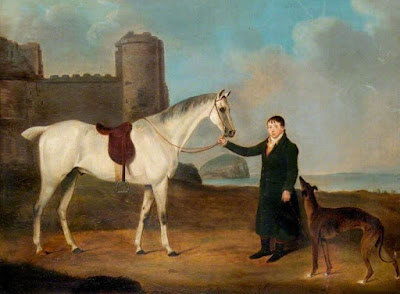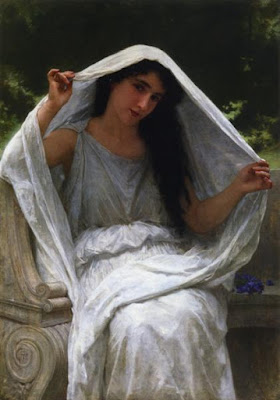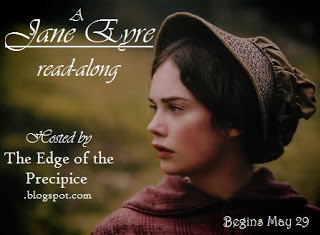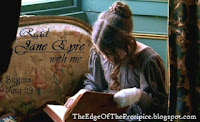Chapter XXIII
Midsummer arrives with a radiance that is breathtaking. Jane is out walking and spies Rochester, but in spite to trying to avoid his notice, he spots her and asks her to accompany him. The conversation begins with his alluding to her departure from Thornfield, which she takes to mean that he is referring to his impending marriage. With a playful cruelty, he teases her, until he reveals that she is his only love and therefore, his only bride. At first, she shows disbelief, but finally is swept away by his emotion. Yet there are hints of foreboding:
“…. And if I had loved him less I should have thought his accent and look of exultation savage; but, sitting by him, roused from the nightmare of parting —- called to the paradise of union —- I thought only of the bliss given to me to drink in so abundant a flow ……”
And although the summer skies had been kissed by the rays of the sun, suddenly a torrential rain begins to fall, hurrying them both inside where Mrs. Fairfax observes them and looks upon their new-found intimacy with a jaundiced eye.
 |
| Garden in Summer (1924) Theo van Rysselberghe source Wikiart |
Chapter XXIV
Jane awakens to sunny skies once more and searches for her errant bridegroom, guided by a rather grave Mrs. Fairfax. Here, their relationship begins a dance of power, as Rochester’s commanding temperament jumps to the forefront as he reveals his plans for their marriage, however Jane pushes back with a quiet persistence but also an almost jaunty playfulness. He admits that he “feigned courtship of Miss Ingram to render you as madly in love with me as I was with you; and I knew jealousy would be the best ally I could call in for furtherance of that end.” Jane admonishes his conduct strongly but softens at his pleas.
“I turned my lips to the hand that lay on my shoulder. I loved him very much —- more than I could trust myself to say —- more than words had power to express.”
As he prepares to take her to Millcote for her wedding trousseau, Jane converses with Mrs. Fairfax who gives mysterious warnings about Rochester’s intentions and counsels caution. More light battles are waged between them as Rochester attempts to get his way and Jane attempts to reign in and tame his impetuosity and imperiousness. Jane appears to triumph, but a rather somber and shocking confession by her ends the chapter.
“Yet after all my task was not an easy one; often I would rather have pleased than teased him. My future husband was becoming to me my whole world; and more than the world; almost my hope of heaven. He stood between me and every thought of religion, as an eclipse intervenes between man and the broad sun. I could not, in those days, see God for His creature: of whom I had made an idol.”
 |
| Village Street T. Campbell source ArtUK |
Wow, what a powerful last paragraph! It’s delightful to see the interplay between Jane and Rochester, and see her beginning to shape his character for the better, yet those last words indicate that there is something more powerful at work there. I don’t remember this dilemma from my last reading, and I’ll be interested to see how Jane reconciles her love of Rochester and her love of God in the coming chapters.
It’s strange how this courtship scene, while resonating with deep passionate love between the two characters, can also arouse waves of profound foreboding.
Oh, and one word about Rochester’s cruel teasing of Jane, as it is often an action that colours the reader’s opinion of him: he does admit that “his principles have gone awry from lack of attention.” His confession indicates two things: 1) he recognizes his bad behaviour and 2) he is willing to change. So hopefully this honest declaration will mitigate some of the animosity a reader might feel towards him.
 |
| Man With a Horse and a Greyhound (1819) John Nost Satorius source ArtUK |
Chapter XXV
Oh my! More and more dark dreams and visions invade the happy pair’s thoughts. One night whilst Rochester is away from home, Jane has dreams, first of carrying a burden of a small child, having Rochester in front of her on a road yet not being able to stop him nor have him hear her cries; next that Thornfield Hall was a ruin, she still carried the child yet saw him riding on horseback away from the destruction; and lastly that a ghastly savage vision of a big woman with curly hair came into her room and rent her veil. When she relates her experiences to Rochester, one can see he is horrified at the latter and Jane believes that it, unlike the others, was not a dream. She does not sleep that night but prepares to face her wedding day with an unsettled and anguished spirit.
 |
| The Veil (1898) William-Adolphe Bouguereau source Wikiart |
This part is where I lose some of my respect for Rochester. He lies when he should have told the truth. Up until now, I could understand him pushing his secret out of his mind, to try to find happiness from a situation that must be a torment to him. So far he has prevaricated, but now, when faced with a blatant action by his wife, that not only threatens his wedding, but perhaps Jane’s life, the fact that he does not finally confess places him in a very unfavourable light. I only hope that he can explain himself in the proceeding chapters.



